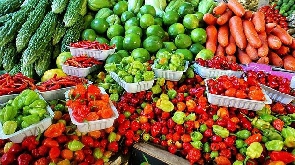The vegetable sector in Ghana will miss out on huge opportunities of the Africa Continental Free Trade Agreement (AfCFTA), once the implementation of the AfCFTA begins without a targeted policy for the development of vegetable value-chain.
At a time when prices of vegetables across the country is on the rise, it has become imperative to develop a specific policy for the vegetable sub-sector, which will target the value-chain of specific commodity across the sector.
During a national dialogue on vegetables, dubbed; systematic approach to vegetable value-chain policy, pandemic response and AfCFTA Agreement, the Executive Director of Agency for Health and Food Security (AHEFS), Mr. Kwaku Asante said, “There is the need to develop a policy for vegetable sector which is specific enough to address specific commodity needs. Most of the commodities in the vegetables sector require specific value-chain attention, because they have variant needs.”
From the latest inflation figures released by the Ghana Statistical Service (GSS), of the food sector, which drove the general inflation to its highest level since 2017 at 11.3 percent, the vegetable sector contributed 34.9 percent.
AHEFS proposed in its final research report that Agricultural policies should be designed for specific crops. For example, there should be vegetable industry policy, cereal and legume production/marketing policy, fruit production and consumption policy, tree crop production policy, among others.
“General policies, as done in Ghana, have never been-an effective way of accelerating the growth of the agriculture sector in any country,” the Agency said.
Government’s commitment over the years has been to improve and stabilize crop yield and prices in the country in order to alleviate poverty and increase food and nutrition security. However, this has demonstrated through a number of agricultural policies/interventions that appear to target the poor.
“So, until we have a value chain specific commodity policy, we will not be able to address the sector bundled. In most cases, the approach to this sector has been combined approach, which really do not solve the key issues affecting the value-chain specific commodity,” Mr. Asante stated.
However, the policies have generally not been specific enough to address the peculiar challenges associated with certain types of crops such as the vegetables and fruits.
Hence, the various agricultural policy interventions have not yielded the intended results as evidenced by the increasing import levels of rice, maize, tomatoes, and onion among others in recent years.
Business News of Wednesday, 17 June 2020
Source: thebftonline.com













